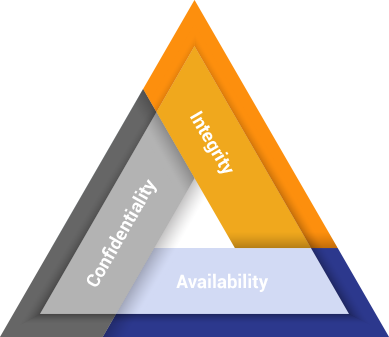Kaytuso is a National Leader in Regulatory Compliance Services for Businesses Across Diverse Industries
Eliminate uncertainty from your compliance efforts with the help of a recognized expert.

Today, almost all organizations are struggling to meet regulatory compliance requirements. As the number of cybersecurity attacks and breaches continues to increase, both government regulators and private industry watchdogs have intensified compliance requirements, strengthened regulations, and increased the size of penalties for failing to meet those standards.
From small organizations trying to comply with the latest iteration of the General Data Protection Regulation (GDPR), to larger organizations that need to ensure strong compliance across their entire IT infrastructure, the Kaytuso team has a solution for all compliance needs.
Twenty years of servicing the regulatory compliance needs of governmental and non-governmental bodies have made us experts in:
-

PCI-DSS
-

HIPAA
-

FINRA/SEC
-

Sarbanes-Oxley Act (SOX)
-

NYS-DFS 500
Kaytuso Comply+ for PCI-DSS – Compliance Services for Businesses of All Sizes
The Payment Card Industry Data Security Standard (PCI-DSS) was designed by credit card companies to safeguard the millions of credit card transactions that occur each day. The regulation outlines a set of general guidelines for accepting, retaining, and destroying cardholder information, as well as prescriptions for technical protections like data encryption implementation and firewall installation.
Despite the PCI-DSS standard having existed since 2006, there are still frequent, high-profile examples of credit card breaches occurring all the time. Why is credit card data so hard to protect? One reason is that many companies don’t even realize they’re expected to be PCI-DSS compliant, which leads to poor data security, breaches, and fines.
Just to be clear, if your organization accepts even one credit card payment — by phone, in person, or over the Internet — then your business is subject to PCI-DSS regulatory requirements.
However, unlike other regulations, PCI-DSS is enforced by the credit card companies themselves, which can inject uncertainty into the compliance process. The Kaytuso team will guide your company through each stage of PCI-DSS implementation, helping you process card payments with confidence.

Assess
Analyze your systems and business processes for weakness.

Remediate
Address compliance gaps, such as poor data handling, cloud services, and mobile devices.

Report
Compliance requires regularly submitting validation and compliance reports to your bank and card companies.
Kaytuso Comply+ for HIPAA Simplifies Healthcare Compliance
Despite the increase in penalties, as many as 70% of healthcare organizations still aren’t adhering to HIPAA guidelines enough to be considered compliant. Though complex, HIPAA compliance isn’t a mystery, as all the necessary processes and controls are laid out online for anyone to read. The problem is that most healthcare organizations lack the knowledge, skills, and human resources to stay consistent with their HIPAA programs.
Organizations that don’t prioritize HIPAA compliance put themselves at risk for a variety of civil and criminal penalties:
| HIPAA Violation Type | Penalty Per Violation | Penalty Per identical Violation in one calender year |
|---|---|---|
| The covered entity does not know or could not have known of the breach | $100 - $50,000 | $25,000 - $1,500,000 |
| The covered entity “know, or by exercising reasonable due diligence would have known,” but didn’t act with willful neglect. | $1,000 - $50,000 | $100,000 - $1,500,000 |
| The covered entity acted with willful neglected but made steps toward remediation within 30 days. | $10,000 - $50,000 | $250,000 |
| The covered entity acted with willful neglected but made no steps toward remediation within 30 days. | $50,000 | $1,500,000 |
In 2018, the U.S. Department of Health and Human Services (HHS) Office of Civil Rights (OCR) collected a record number of HIPAA fines, meaning that smaller healthcare organizations can no longer realistically rely on their size and relative obscurity to keep them safe.
Kaytuso has a solution to any HIPAA need, from risk assessment and business impact analysis to the implementation of all the technical, administrative, and physical safeguards that it requires of healthcare organizations.
Twenty years of HIPAA service to the healthcare industry has made us a HIPAA expert
-

HIPAA Security Assessments
-

Vendor and Business Associates Management
-

Deployment of encryption systems to safeguard ePHI
-

Organization-wide identity and access management controls
World-Class FINRA Service for the Financial Industry
The Financial Industry Regulatory Authority (FINRA) is a non-governmental agency that, along with the Securities Exchange Commission (SEC), regulates the financial industry. FINRA has outlined a detailed set of controls and processes for protecting the security and privacy of financial data. Some of the key points in the FINRA guideline include:
 Archiving of all communications – Bloomberg, Slack, SMS, Teams, Email, and more
Archiving of all communications – Bloomberg, Slack, SMS, Teams, Email, and more Tracking the location and risk severity of personally identifiable information (PII)
Tracking the location and risk severity of personally identifiable information (PII) Removing unnecessary PII from company devices to lower compliance exposure
Removing unnecessary PII from company devices to lower compliance exposure Identifying and assessing third party access to financial data
Identifying and assessing third party access to financial data Secure encryption and decryption of company and client data assets
Secure encryption and decryption of company and client data assets
FINRA regulations lean heavily on established cybersecurity frameworks and models, including the National Institute for Standards and Technology (NIST) Cybersecurity Framework, and the CIA triad of confidentiality, integrity, and availability, both which help ensure that the most pressing cyber threats are mitigated in order of their priority.

Confidentiality
Ensure data isn’t disclosed to unauthorized individuals.Integrity
Prevent data from being altered or destroyed in an unauthorized manner.Availability
Maintain the readiness of systems that store and access PII.
Stop Worrying About Cybersecurity
Our team of friendly, helpful security experts are always available to answer your questions. Need cybersecurity assistance?
 Ask Us Anything
Ask Us Anything
Call Now for a Free Consultation
212-792-9932
Or send us a note